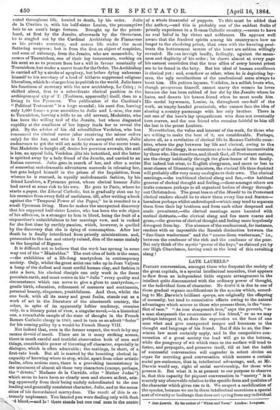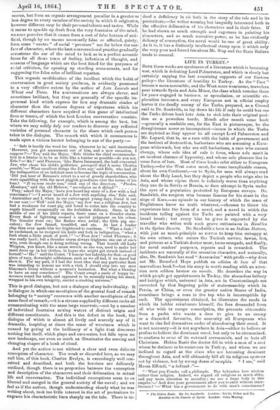LATE LAURELS.*
PIQUANT conversation, amongst those who frequent the society of the great capitals, is a special intellectual secretion, that appears to flow from an independent little organic arrangement in the intellect quite disconnected with the ordinary power of thought, or the individual form of character. No doubt it is due to one of those gradual organic modifications in the species which, accord- ing to Mr. Darwin's brilliant apergu, are originally the offspring of necessity, but tend to cumulative effects owing to the natural advantages which accrue to those who possess them, in the "con- flict of race." "As iron sharpeneth iron," says the proverb, "so a man sharpeneth the countenance of his friend," or as we may perhaps interpret it, so does the expression on the face of one man whet and give unexpected temper and keenness to the thought and language of his friend. But if this be so, the Dar- winian law must certainly apply, and in the competitive con- versation of a great society the lead will go to the bottom, while the pungency of wit which rises to the surface will tend to foster, and propagate, and preserve itself, till at last the habit of successful conversation will engender in select circles an organ for secreting good conversation which secures a certain social pre-eminence, that is, intellectual advantage, and, as Mr. Darwin would say, right of social survivorship, for those who possess it. But what it is at present to our purpose to observe is, that this capacity for piquant conversation in " society " is in scarcely any observable relation to the specific form and qualities of the character which gives rise to it. We suspect a modification of the species, because we see in these intellectual secretions a special sort of vivacity or badinage that does not springfrom any individual
• Leta Law& By the author of " Wheat and Tares." London: Longman.
source, but from an organic arrangement peculiar in a greater or less degree to every member of the society in which it originates, however different may be their personal talents and tastes. While it seems to sparkle up fresh from the very fountains of the mind, we soon perceive that it comes from a sort of false bottom of arti- ficial, though by no means necessarily false or affected, gaiety, from some " centre " of social " pressure " not far below the sur- face of character, where the best conversational practice gradually accustoms the ear of the mind to lurk as in a perfect acoustic focus for all those tones of feeling, inflexions of thought, and nuances of language which are the best fitted for the purposes of serial criticism, for opening up startling cross-scents, and for suggesting the false echo of brilliant repartee.
This organic modification of the intellect which the habit of conversation in good society produces, is evidently possessed to a very effective extent by the author of Late Laurels and Wheat and Tares. His conversations are always clever, and sometimes brilliant, but they are generally of the specific im- personal kind which express far less any dramatic shades of
character than the various degrees of expertness which his different characters have acquired at this game of intellectual
fives or tennis, of which the best London conversation consists. Take the following, for example, which is among the best, but where we may safely defy our readers to discover any reflected varieties of personal character in the share which each person takes in the dialogue. The remark with which it commences is
made upon a vicious hunter belonging to one of the party:— "'Safe is hardly the word for him, wherever ho is,' said Anstruther However, you get amusement out of him, and a new sensation, I suppose ?'—' Yes,' said the Major, Erle thinks the chief recommenda- tion in a hunter is to be as little like a hunter as possible—do you not, Erie ?'—`1th !' said Florence, 'like Baron Immanuel, the half-converted Jew, who chose his child's godfather, parcequ'il eat le mans C1a•Etien possible.'—' What excellent things the Jews say,' said Erie, who had all the indisposition of an indolent man to become the topic of conversation. `Did you hear of Benassa's retort to a set of greedy shareholders, who were squabbling with the moat piggish greediness over the terms of his loan? "11 venous avaler tons," cried one of the directors. "Pardon, Messieurs," said the old Hebrew, "ma religion me le defend."' . . . . . . `Pray,' asked the Major, have you heard my story of a Jew with a bad conscience ? I never heard of a Jew with anything else,' Erie said. Anstruther and I, when in our extravagant young days, found it out to our cost.'—' Well' said the Major, my Jew was a religious Jew, but had a weakness for roast pig, and loved to retire into the country to regale himself occasionally on the forbidden delicacy. Once, in the middle of one of his illicit repasts, there camo on a thunder storm. Every flash of lightning seemed a special judgment on his crime. The thunder went on; the flashes were awful ; the little pig suc- culent; the Jew fumed, trembled, and ate. At last a louder clap than ever made him too frightened to continue. " What a fush ! " he exclaimed, as he resigned his knife and fork in indignation, "what a lush about a little piesh of pork ! " Poor Jew ! ' cried Florence ; it was really hard ; but a thunder storm always frightens one out of one's wits, even though one is doing nothing wrong. That horrid old Lady Whigton, you know, like a mean wretch as she was, used to make her maid dress up in her clothes, in hopes she might get struck instead of herself.'—' Ha! ' said the Count, '1 honour her ladyship for that—a good piece of racy, downright selfishness, such as we all feel, if we dared but show it. For my part, if I had the least idea that any particular flash was intending to honour me with a visit, I should step into my man Giacomo's livery without a moment's hesitation. But what a blessing to have an easy conscience !' The Count swept a smile of happy in- nocence round the table, and appeared to be mentally taking his stand, wrapped in his own integrity, amidst a crashing universe."
This is good dialogue, but not a dialogue of any individuality. It is dialogue in which one mouthpiece of the general fund of remark belonging to "society" converses with another mouthpiece of the same fund of remark,—it is a stream supplied by different cocks all communicating with the same large reservoir,—not by a number of individual fountains mixing waters of distinct origin and different constituents. And this is the defect in the book, the dialogue of which is almost all lively and scarcely any of it dramatic, inspiring at times the sense of weariness which is caused by gazing at the brilliancy of a light that diticovers nothing but itself, which plays and coruscates, but falls upon no new landscape, nor even so much as illuminates the moving and changing shapes of a bank of cloud.
And yet the author is not without a clear and even delicate conception of character. The weak or discarded hero, as we may
call him, of this book, Charles Evelyn, is exceedingly well con- ceived and described, and both the heroines are delicately outlined, though there is no proportion between the conception and description of the characters and their delineation in actual life and conversation. The individual conceptions seem to us blurred and merged in the general society of the novel ; and we feel as if the author, though understanding clearly what be was writing about, took too little interest in the art of portraiture to engrave his characteristic lines sharply on the tale. There is in-
deed a deficiency in vis both in the story of' the tale and in its portraiture,—the writer seeming but languidly interested both in the effective delineation of his characters and in their fates. If he had shown as much strength and eagerness in painting his characters, and as much narrative power, as he has evidently delicacy of conception, the novel would be one of great ability. As it is, it has a distinctly intellectual stamp upon it which only the very poor and forced fun about Mr. Slap and the State Boilers tends to conceal.































 Previous page
Previous page